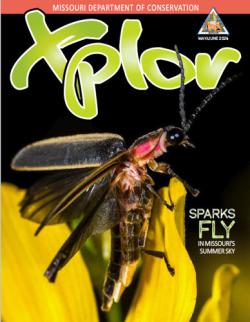
Xplor reconnects kids to nature and helps them find adventure in their own backyard. Free to residents of Missouri.


































Stay in Touch with MDC news, newsletters, events, and manage your subscription

Xplor reconnects kids to nature and helps them find adventure in their own backyard. Free to residents of Missouri.

A monthly publication about conservation in Missouri. Started in 1938, the printed magazine is free to residents of Missouri.
PUXICO–A particularly successful night of bowfishing left one southeast-Missouri man with a state record and another thinking about what might have been.
Ben Fraley and David Warren, both of Sikeston, were bowfishing together at Duck Creek Conservation Area (CA) in Bollinger County March 23 when Fraley hauled in a 10-pound bowfin, a primitive type of fish. Soon afterward, Warren shot an 11-pound, 4-ounce bowfin.
“We laughed about it at the time,” says Warren. “It hadn’t been two minutes and I shot a bigger fish than his.”
Warren knew Missouri’s state record for bowfin stood at 9 pounds, 2 ounces. He suspected that both his and Fraley’s fish were bigger than that, so he contacted Conservation Agent Mic Plunkett to verify his fish’s weight and species. A week later, he got a letter from the Missouri Department of Conservation (MDC) notifying him that he was the new holder of the record for bowfin taken by methods other than hand-held pole and line.
Reached by phone, Warren was asked why he had not frozen his fish and let Fraley enter his 10-pounder as a state record, then applied for his own record. Silence followed.
“That never crossed our minds,” Warren finally said, laughing. “I guess we could have done it that way.”
Fisheries Programs Specialist Andrew Branson, who supervises Missouri’s fishing-records program, said Fraley might have qualified for a state record if his fish was larger than the existing record.
“If they both caught fish larger than the existing record and Mr. Fraley had submitted his fish before Warren’s, it could have been a legitimate record. He still has the satisfaction of knowing he caught a very large bowfin. However, it won’t appear in official records. That potential opportunity vanished when we certified Mr. Warren’s record fish.”
Branson says failure to register state-record fish is fairly common.
“You have to be thinking about a record before you can set one,” he notes. “Fish lose weight rapidly after being caught, and there are cases where fish are hauled around for awhile before being submitted for verification and then barely fall short of record weight. Plus, there probably are a lot of fish that end up on the table without anyone ever considering whether they might be records.”
Although Fraley will not have a state-record certificate to hang on his wall, Branson says he qualifies for another type of recognition. MDC’s Master Angler Award recognizes anglers who catch unusually large fish but fall short of records. The minimum qualifying weight for bowfin under the Master Angler program is 8 pounds, making Fraley a shoo-in for the honor.
Master Anglers receive certificates suitable for framing. For details about the Master Angler and State-Record Fish programs, visit mdc.mo.gov/fishing/reports/records.
Record fish are one reason Missouri is a great place for outdoorspeople. Missouri currently holds four all-tackle records and 19 line-class records recognized by the International Game Fish Association of Dania Beach, Fla.
The bowfin also is known as dogfish, grindel or grinnel, swamp bass, cypress trout, lawyerfish, mudfish and, in recognition of its fighting ability, swamp muskie. It is the only surviving species from a family of fish that dates back at least 180 million years. It looks like a fossil come to life. One vestige of its ancient origins is the ability to breathe air by using its swim bladder as a lung.
The bowfin’s long dorsal fin has no spines, but its mouth is full of needle-like teeth, making a landing net a handy piece of equipment for anglers in bowfin territory. Weights up to 20 pounds have been documented for the bowfin.
The bowfin is a lowland species, inhabiting swamps, sloughs, borrow ditches, oxbow lakes and sluggish streams in southeast Missouri and the Mississippi River Valley. Its dislike of strong currents probably accounts for its nearly complete absence in the Missouri River drainage.